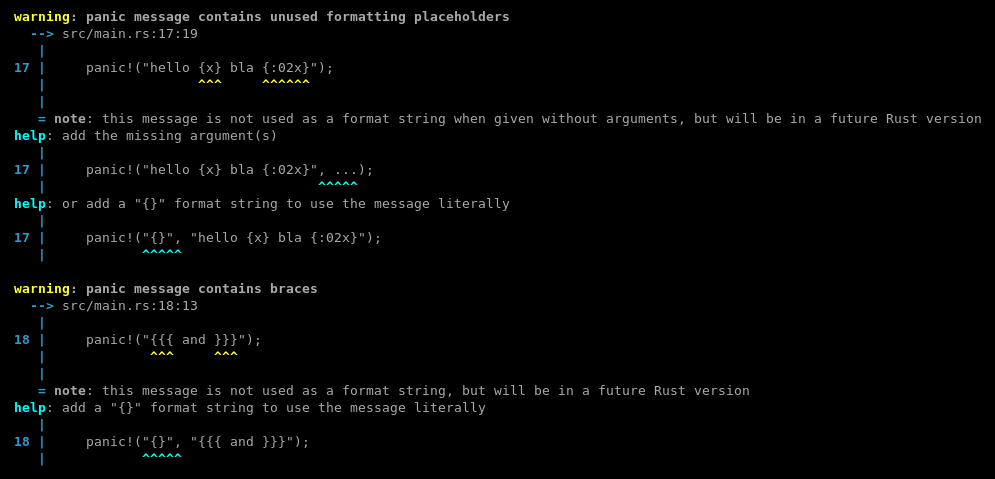Add lint for panic!("{}")
This adds a lint that warns about `panic!("{}")`.
`panic!(msg)` invocations with a single argument use their argument as panic payload literally, without using it as a format string. The same holds for `assert!(expr, msg)`.
This lints checks if `msg` is a string literal (after expansion), and warns in case it contained braces. It suggests to insert `"{}", ` to use the message literally, or to add arguments to use it as a format string.

This lint is also a good starting point for adding warnings about `panic!(not_a_string)` later, once [`panic_any()`](https://github.com/rust-lang/rust/pull/74622) becomes a stable alternative.
Make as{_mut,}_slice on array::IntoIter public
The functions are useful in cases where you want to move data out of the IntoIter in bulk, by transmute_copy'ing the slice and then forgetting the IntoIter.
In the compiler, this is useful for providing a sped up IntoIter implementation. One can alternatively provide a separate allocate_array function but one can avoid duplicating some logic by passing everything through the generic iterator using interface.
As per suggestion in https://github.com/rust-lang/rust/pull/78569/files#r526506964
Clarify availability of atomic operations
This was noticed while we were updating the embedded rust book: https://github.com/rust-embedded/book/pull/273/files
These targets do natively have atomic load/stores, but do not support CAS operations.
This macro is used in expression position (a match arm), and only
compiles because of #33953
Regardless of what happens with that issue, this makes the
usage of the macro less confusing at the call site.
add trailing_zeros and leading_zeros to non zero types
as a way towards being able to use the optimized intrinsics ctlz_nonzero and cttz_nonzero from stable.
have not crated any tracking issue if this is not a solution that is wanted
Rename/Deprecate LayoutErr in favor of LayoutError
Implements rust-lang/wg-allocators#73.
This patch renames LayoutErr to LayoutError, and uses a type alias to support users using the old name.
The new name will be instantly stable in release 1.49 (current nightly), the type alias will become deprecated in release 1.51 (so that when the current nightly is 1.51, 1.49 will be stable).
This is the only error type in `std` that ends in `Err` rather than `Error`, if this PR lands all stdlib error types will end in `Error` 🥰
Test structural matching for all range types
As of #70166 all range types (`core::ops::Range` etc.) can be structurally matched upon, and by extension used in const generics. In reference to the fact that this is a publicly observable property of these types, and thus falls under the Rust stability guarantees of the standard library, a regression test was added in #70283.
This regression test was implemented by me by testing for the ability to use the range types within const generics, but that is not the actual property the std guarantees now (const generics is still unstable). This PR addresses that situation by adding extra tests for the range types that directly test whether they can be structurally matched upon.
Note: also adds the otherwise unrelated test `test_range_to_inclusive` for completeness with the other range unit tests
Duration::zero() -> Duration::ZERO
In review for #72790, whether or not a constant or a function should be favored for `#![feature(duration_zero)]` was seen as an open question. In https://github.com/rust-lang/rust/issues/73544#issuecomment-691701670 an invitation was opened to either stabilize the methods or propose a switch to the constant value, supplemented with reasoning. Followup comments suggested community preference leans towards the const ZERO, which would be reason enough.
ZERO also "makes sense" beside existing associated consts for Duration. It is ever so slightly awkward to have a series of constants specifying 1 of various units but leave 0 as a method, especially when they are side-by-side in code. It seems unintuitive for the one non-dynamic value (that isn't from Default) to be not-a-const, which could hurt discoverability of the associated constants overall. Elsewhere in `std`, methods for obtaining a constant value were even deprecated, as seen with [std::u32::min_value](https://doc.rust-lang.org/std/primitive.u32.html#method.min_value).
Most importantly, ZERO costs less to use. A match supports a const pattern, but const fn can only be used if evaluated through a const context such as an inline `const { const_fn() }` or a `const NAME: T = const_fn()` declaration elsewhere. Likewise, while https://github.com/rust-lang/rust/issues/73544#issuecomment-691949373 notes `Duration::zero()` can optimize to a constant value, "can" is not "will". Only const contexts have a strong promise of such. Even without that in mind, the comment in question still leans in favor of the constant for simplicity. As it costs less for a developer to use, may cost less to optimize, and seems to have more of a community consensus for it, the associated const seems best.
r? ```@LukasKalbertodt```
Refactor IntErrorKind to avoid "underflow" terminology
This PR is a continuation of #76455
# Changes
- `Overflow` renamed to `PosOverflow` and `Underflow` renamed to `NegOverflow` after discussion in #76455
- Changed some of the parsing code to return `InvalidDigit` rather than `Empty` for strings "+" and "-". https://users.rust-lang.org/t/misleading-error-in-str-parse-for-int-types/49178
- Carry the problem `char` with the `InvalidDigit` variant.
- Necessary changes were made to the compiler as it depends on `int_error_matching`.
- Redid tests to match on specific errors.
r? ```@KodrAus```
Stabilize `Poll::is_ready` and `is_pending` as const
Insta-stabilize the methods `is_ready` and `is_pending` of `std::task::Poll` as const, in the same way as [PR#76198](https://github.com/rust-lang/rust/pull/76198).
Possible because of the recent stabilization of const control flow.
Part of #76225.
Partially fix#55002, deprecate in another release
Co-authored-by: Ashley Mannix <kodraus@hey.com>
Update stable version for stabilize_spin_loop
Co-authored-by: Joshua Nelson <joshua@yottadb.com>
Use better example for spinlock
As suggested by KodrAus
Remove renamed_spin_loop already available in master
Fix spin loop example
`crate::` -> `core::`
It looks weird to have `crate::` in the link text and we use the actual
crate name everywhere else.
If anyone is curious, I used this Vim command to update all the links:
%s/\(\s\)\[`crate::\(.*\)`\]/\1[`core::\2`](crate::\2)/g